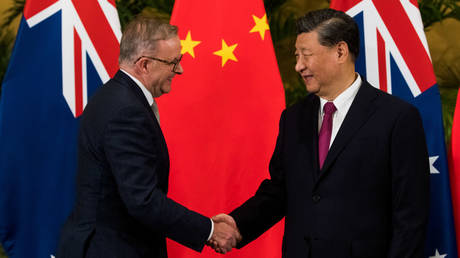
The new government in Canberra is markedly less antagonistic to Beijing than its predecessor – but does that mean a rapprochement is coming?
Australian Foreign Minister Penny Wong recently made a visit to Beijing, China. Although the visit was diplomatic protocol, it was nonetheless significant because it symbolizes a shift of sorts in Canberra’s foreign policy towards China, one which began with Australian Prime Minister Anthony Albanese’s meeting with Xi Jinping at G20 a month ago.
Having undergone a change of government this year, with Albanese’s Labor replacing Scott Morrison’s vitriolically anti-China Liberal party, Canberra has to some extent softened its stance on Beijing.
But the question is: How much? And to what extent? Australia’s relationship with China cratered about a year ago. Despite the two countries having built up an extremely lucrative economic relationship, which even went to the extent of being called a “strategic partnership,” Scott Morrison made the decision to tilt against Beijing in favor of the United States.
For Australian foreign policy, that is not new or surprising. However, Morrison’s government was aggressively anti-China in its rhetoric to the point where it was profoundly destabilizing, and starting in 2020, after he began to call for an inquiry on the origins of Covid-19, Beijing responded with a series of sweeping bans on Australian exports (with China being its largest market). This included goods such as coal, wine, barely and seafood, amongst other things. It is, of course, now an assumed, but not confirmed, understanding that because China is engaging with Australia again, that these bans will probably be quietly repealed, and that’s a priority for the new government in Canberra.
So what brought about the change? While Australia, as a member of the Anglosphere, is probably the single most loyal pro-US nation in the world in terms of foreign policy, it appears the Labor government is more moderate than the Trump-like China nemesis Scott Morrison. It is therefore more pragmatic that, despite growing geopolitical conflict, maintaining a stable relationship with China is vital to Australia’s national interests. China remains Australia’s largest trading partner, its largest source of international students and an important source of inbound investment. While all Australian governments are pro-US, the argument is that Scott Morrison was simply reckless.
As a result, many aspects of Australia’s foreign policy remain unchanged, they are just not approached with the same level of abrasiveness or rhetorical chauvinism. Canberra remains a key member of critical anti-China coalitions such as the Quad and AUKUS. It may be quieter and calmer, but it is still seen by the United States as a key military partner in the event of a potential contingency with Beijing and thus essential to its containment. Since the end of World War II, after all, Australia has never wavered in its loyalty to US military objectives, be it in Vietnam, Iraq, Afghanistan or wherever.
This foreign policy attitude is derived from Anglophone exceptionalism, the reality of Australia having been a British Empire-derived colonial nation. As such, contemporary Australia sees American power as essential to the maintenance of its own privileged position in the Pacific. This is why some have even accused the CIA of mounting a coup against the country’s former prime minister, Gough Whitlam, the man who in fact normalized Australia’s relations with China, because he risked transforming Australia into a non-aligned country. This exceptionalism has also led Australia to have a tradition of ‘Yellow Peril’ racism, in which Asian cultures (in particular China) are seen as the biggest threat to Australia’s identity, a phenomenon which the Scott Morrison government strongly weaponized.
However, the reality of modern Australia is more complex. Consider for one that Penny Wong is an ethnic Chinese Australian. Thus, while old attitudes remain, it also reflects an increasingly diverse and changing country which, under the right government, can bring more balance, and it is no wonder that Morrison’s anti-Chinese rhetoric cost him the votes of many Chinese-Australian constituents.
Ultimately, though, Australia’s foreign policy choices remain limited. It can either be hardline anti-China, or pragmatically pro-US and cautious with China. Given the course of events, it is clear Beijing is willing to accept the latter. Australia will never be China’s best friend, but if it is a country that it can work with – at least by building a stable economic relationship and mature diplomacy – then it isn’t too much of a problem. China will happily engage US allies when there is room to split them from absolute devotion to Washington.




